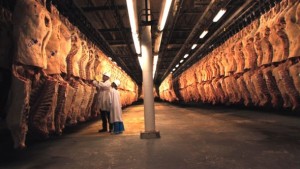If companies don’t tell their story, they leave themselves vulnerable to others, who will gladly tell their version of the story.
 NPR says that food companies the world over are paying close attention to the groundswell of support for food transparency, the “know where your food comes from” movement.
NPR says that food companies the world over are paying close attention to the groundswell of support for food transparency, the “know where your food comes from” movement.
JBS, the largest meat producer in the world, is beginning to take notice as well.
But executives with JBS USA, the North American arm of its Brazilian parent company, at the same time acknowledge that the very nature of their business is grisly, gory and sometimes unpalatable.
“Part of you says, ‘I need to learn how to bring the packing house into the consumer’s living room,'” says Bill Rupp, president of the company’s beef division. “Then at the same time, you think of all the pitfalls of trying to explain to consumers how we harvest their meat.”
“I think in today’s society, the consumer wants to know more and more where their food comes from. And food companies are slowly adopting toward that,” says Cameron Bruett, JBS USA spokesman. “But I think we need to do a better job.”
JBS owns numerous plants cross the Midwest, South and West of the U.S., as well as worldwide. The JBS meatpacking plant in Greeley, Colo., is an imposing building. Conveyor belts snake through the concrete structure. But it’s not an assembly line. Workers in blood-spattered smocks disassemble cattle, breaking down whole animals into cuts of meat.
During a guided tour for journalists, the plant’s manager, Bill Danley, points to a line of men carving the animal’s head. “These guys here, what they’re doing is, they’re taking the cheek meat off,” Danley says. “There’s head meat on top of that. A lot of your taco filler is made out of cheek meat and head meat.”
Taco meat is just the beginning. This one cow is destined to be sirloin at steakhouses, ground hamburger at local grocery stores and leather for car seats.
JBS spokesman Bruett says for a long time, beef has been a commodity, shipped out from meatpacking plants in boxes and rebranded at grocery stores and restaurants. Bruett says when your immediate customers are other businesses, there’s little value in telling your story.
